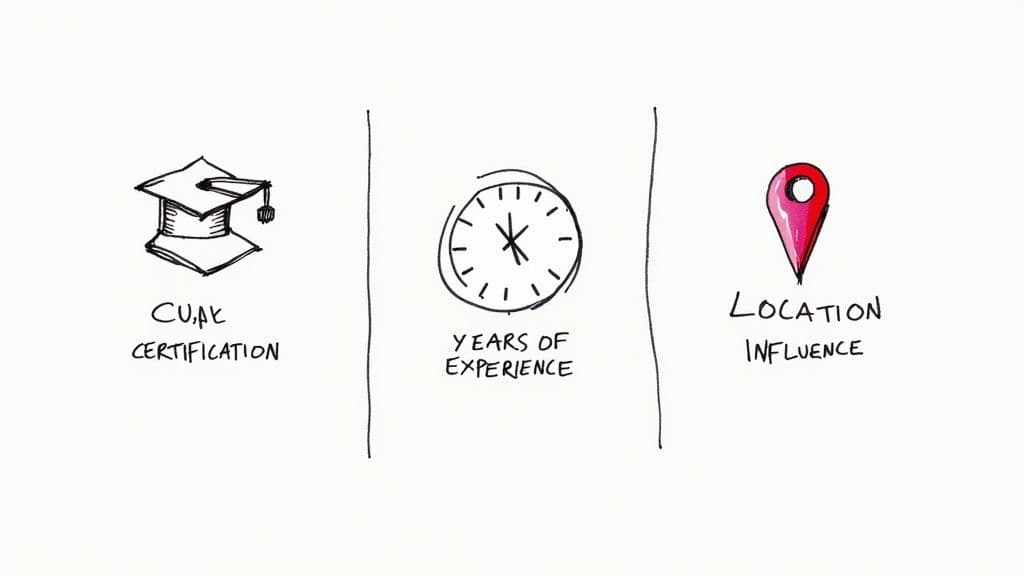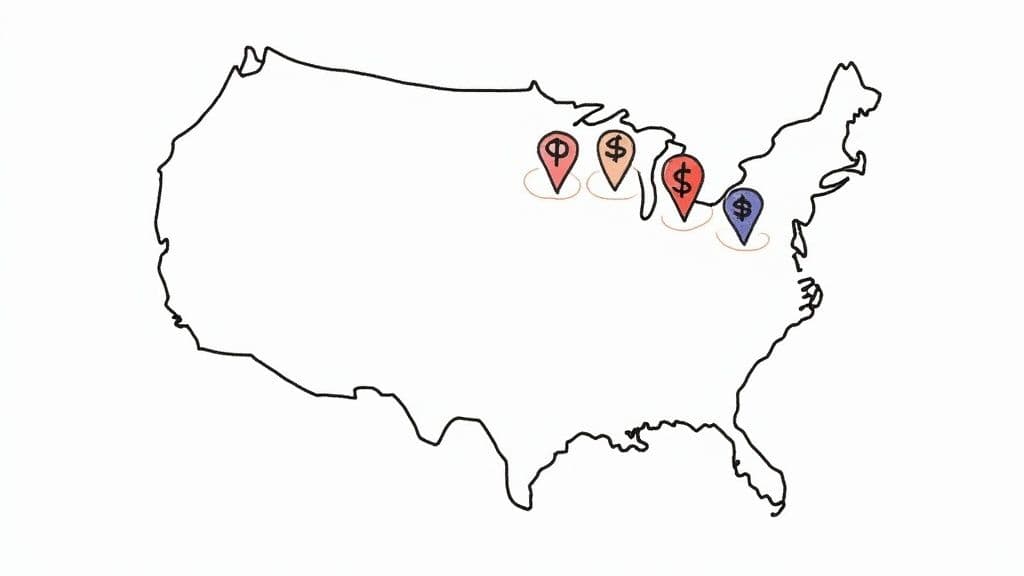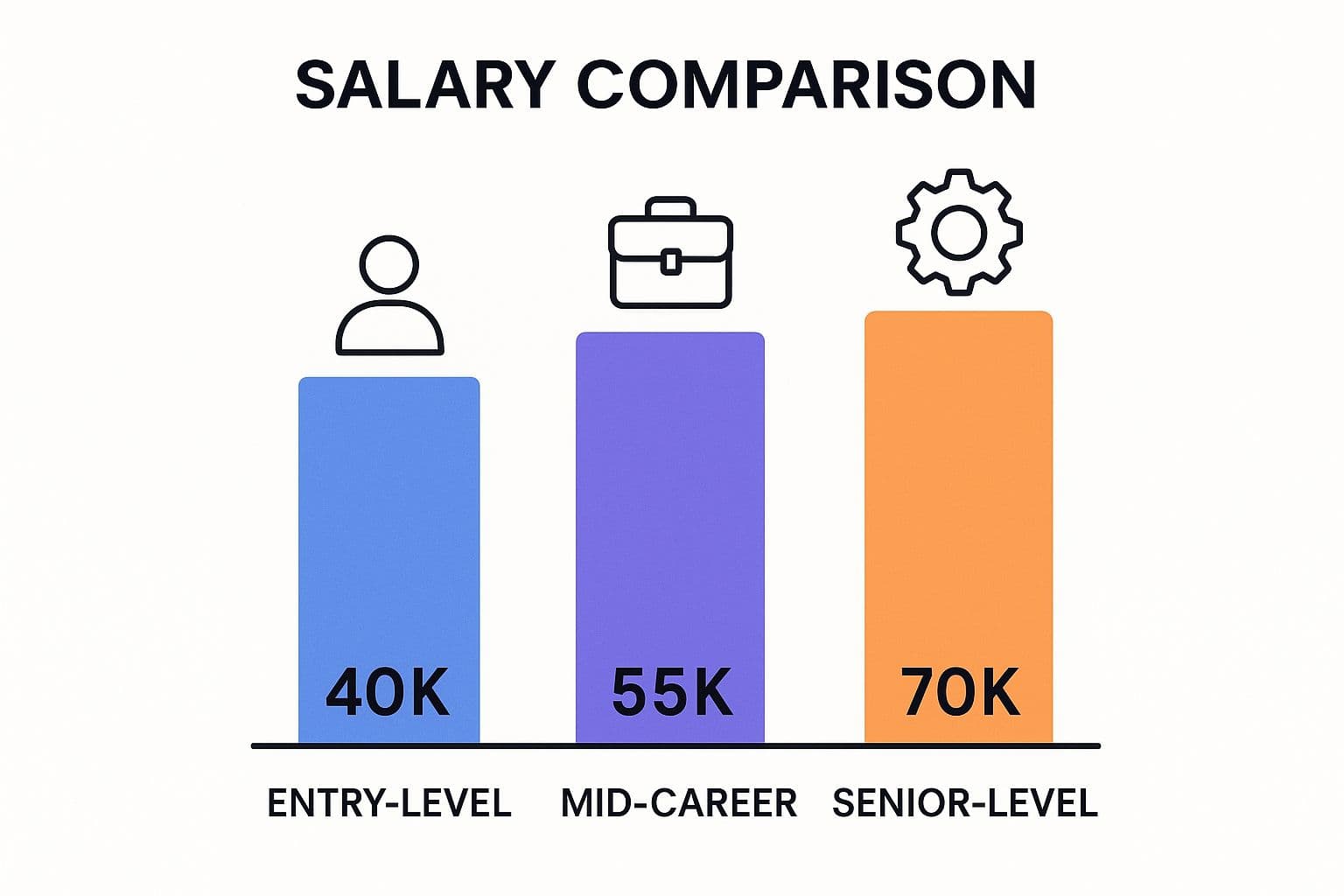So, you're thinking about a career as a health coach in the UK and wondering what you can actually earn. Let's get straight to it.
The headline figure you'll see everywhere is around £28,000 per year. But honestly, that number is just a signpost, not the destination.
Think of it as the middle ground. Your real-world earnings can swing pretty dramatically depending on where you are, who you work for (or if you work for yourself), what you specialise in, and how much experience you've got under your belt.
A Financial Snapshot of UK Health Coach Salaries
The demand for health coaches is solid across different sectors – from private companies wanting to boost employee wellbeing to NHS providers and, of course, clients you work with directly. This creates a whole spectrum of earning potential.
So let’s break down the money side of things.
UK Health Coach Salary at a Glance
To give you a clearer picture, here’s a quick summary of what the average health coach is bringing in across different timeframes.
| Timeframe | Average Earnings |
|---|---|
| Per Year | £28,160 |
| Per Month | £2,347 |
| Per Hour | £13.91 |
These figures, based on data from mid-2025 across nearly 2,000 job listings, show a steady, reliable market. A newly qualified coach might start nearer the £27,086 mark, while a seasoned pro with a great track record could command £30,208 or even more.
The key takeaway? There's a solid baseline, but your expertise and where you choose to work are what will really define your pay cheque. You can always dig into more detailed salary stats on sites like Jooble to see live market trends.
Key Takeaway: The average salary provides a decent foundation, but don't get fixated on it. Your individual circumstances—especially your location and expertise—are what will truly shape your earning potential.
Location, Location, Location
This one’s a biggie. Where you set up shop matters. A lot.
It’s no surprise that roles in Southern England, particularly around London, often come with a higher salary to offset the steeper cost of living. But even outside the capital, certain towns and cities have become hotspots for high-paying health coach roles.
Some of the top-paying areas right now include:
- Welwyn, Hertfordshire: A hotspot for corporate HQs that are serious about their employee wellness programmes.
- Daventry, Northamptonshire: Its central location makes it a surprisingly strategic hub for various organisations.
- Wallingford, Oxfordshire: Tucked away in an affluent area with plenty of specialised health centres and high-net-worth clients.
This just goes to show how crucial it is to research your local market. A job in a major city might look great on paper, but you’ve got to weigh that salary against rent and living costs to figure out what you’ll actually take home.
How Experience Level Impacts Your Earnings
Just like any skilled profession, your health coach salary isn't some fixed number. It’s a living figure that grows as you do.

64b534e6-3dbb-4b61-98d3-c50f11594e71.jpg
Think of your career like climbing a mountain. When you first set out, you're at the base, just learning the terrain. But as you gain real-world experience and climb higher, your perspective—and your value—increases big time. This climb is reflected directly in your payslip.
It's not just about the number of years you've been in the game. It’s about the quality of that experience, the clients you’ve transformed, and the skills you sharpen along the way. All of it builds your earning potential.
The Entry-Level Stage
As a newcomer, you’re all about building that solid foundation. You’re polishing your coaching techniques, figuring out what really works, and starting to collect those all-important client success stories. It’s only natural that your salary will be on the lower end as you prove what you can do.
In the UK, the career path for health coaches shows a clear link between putting in the time and seeing your salary grow. The latest data shows that entry-level coaches with 1-4 years of experience pull in an average total compensation of £20,993 a year. This figure usually includes any bonuses or overtime, giving you a realistic starting point. You can explore more detailed salary data on PayScale to see how things shake out.
This early stage is absolutely crucial. Every testimonial and success story you gather is another piece of proof that justifies higher rates down the line.
Advancing to Mid-Career and Beyond
Once you've got a few years under your belt, your financial picture starts looking a whole lot brighter. With a proven track record, you’re no longer just a coach; you're a trusted expert.
A mid-career pro with 5-9 years of dedicated experience can expect their average earnings to climb to around £23,000 per year. That jump reflects the massive value seasoned coaches bring, from a deeper grasp of client psychology to more refined coaching methods.
The salary range doesn't stop there. It can push up to £28,000 and beyond, especially for coaches who step into more advanced roles. This might mean:
- Supervising new coaches: Mentoring the next generation and guiding their development.
- Developing signature programmes: Creating your own unique, high-value coaching packages that get incredible results.
- Specialising in a profitable niche: Becoming the go-to person for something specific, like corporate wellness or managing chronic conditions.
At the end of the day, experience is so much more than time served. It’s the wisdom, the confidence, and the undeniable results you bring to every client. If you strategically build your expertise and make sure to showcase your wins, you can put your salary growth on the fast track.
Where You Work & Who You Work For
Okay, let's get down to brass tacks. Beyond your own experience, the two biggest things that will move the needle on your health coach salary are your postcode and who's signing your pay cheques.

c97b4262-0ea6-4411-8a8c-99272c1b73c5.jpg
Think of it like property prices. A flat in central London will always cost more than a house in a sleepy village, right? It’s the same logic with salaries. Big city hubs like London or Manchester pack a bigger punch because the cost of living is higher and there's a dense concentration of clients—both private and corporate—willing to pay for your expertise.
This doesn't mean a role in a smaller town is a bad move. Far from it. While the headline salary might be lower, so are your living costs. Your actual spending power could end up being the same, or even better. It’s all about context.
The Great Divide: Public vs. Private Employers
Your choice of employer isn’t just about the money; it shapes your entire career experience, from benefits to work-life balance. In the UK, you’re basically looking at two main paths, and each has its own financial personality.
Lots of coaches have their sights set on a role within the National Health Service (NHS). With the rise of Primary Care Networks (PCNs), positions for Health and Wellbeing Coaches are popping up everywhere. This is the stability route. You get rock-solid job security, a proper pension, and a clear pay scale thanks to the Agenda for Change system.
While an NHS role provides stability and excellent benefits, private sector positions, particularly in corporate wellness, often lead the pack in pure salary potential.
Then you have the private sector. This is a much broader world, covering everything from posh fitness studios and luxury spas to massive corporations with in-house employee wellness programmes.
Comparing Your Career Options
Let’s be honest: a job at a high-end private clinic in the City of London will almost certainly pay more than an equivalent NHS post. Why? These companies are fighting for top talent and are ready to offer a premium for coaches who can deliver tangible results, like slashing employee stress levels or boosting team health metrics.
So, what are the trade-offs? It really boils down to this:
- NHS Roles: Think predictable salaries (often Band 4 or 5), a great pension, and the security that comes with a public sector job. Your focus is on improving public health outcomes.
- Corporate Wellness Firms: This is where you’ll find higher base salaries and the potential for performance-based bonuses. The work is business-driven, aimed at boosting company productivity and cutting healthcare costs.
- Private Clinics & Gyms: Salaries here can be a real mixed bag. A swanky establishment in an affluent area might pay very competitively, but a smaller local gym will likely have a lower starting wage.
Ultimately, there’s no single “best” path. It all comes down to what you value most. Are you after the stability and sense of mission that comes with the NHS? Or are you chasing the higher earning potential and fast-paced vibe of the corporate world?
Knowing the answer to that question is the key. You can then strategically target your job search to the locations and employer types that align with your financial goals, which is a massive step towards maximising your health coach salary.
Using Specialisations To Increase Your Salary

dad8dcdc-98a6-49f8-97ed-4c38c655d7d9.jpg
While being a general health coach is a fantastic start, the real key to unlocking a higher health coach salary is to specialise. It's one of the most powerful moves you can make in your career.
Think of it this way: a GP is essential, no doubt. But a heart surgeon charges a premium for their very specific, high-stakes expertise. By becoming the go-to expert for a particular problem, you do the same. You're no longer just a health coach; you're the coach for a specific, urgent need.
This instantly drives up your value because clients will always pay more for a solution that feels like it was made just for them.
Lucrative Niches To Explore
Picking a niche isn't just about what you love—it's a smart business decision. The sweet spot is where your passion meets a real, profitable market demand. Instead of being one of many, you become one of a kind.
A few of the most profitable areas right now include:
- Corporate Wellness Coaching: Companies are pouring money into their employees' wellbeing. They know it boosts productivity and cuts down on sick days, making a coach who gets the corporate world a huge asset.
- Diabetes and Chronic Illness Management: This is high-impact work. Helping people manage long-term health conditions is an invaluable service that individuals and even healthcare providers will pay top-dollar for.
- Executive Stress and Burnout Prevention: Top-level executives are constantly under pressure. They are more than willing to invest heavily in a coach who can help them perform at their best without their health taking a hit.
- Weight Loss for Specific Demographics: Don't just be a general "weight loss" coach. Get specific. Focus on post-natal women, men over 40, or people with PCOS. Your services become instantly more relevant and desirable.
By specialising, you take yourself out of the general competition. You carve out your own category where you are the obvious choice. This gives you massive leverage to charge higher rates for your services.
The Power of Respected Certifications
Once you’ve found your niche, the next step is to back it up with credentials that people trust. While the UK coaching industry isn't super strict on regulation, some certifications carry serious weight with employers and give clients peace of mind.
For example, becoming a National Board-Certified Health & Wellness Coach (NBHWC) is widely seen as the gold standard. Other credentials, like those from the UK Health Coaches Association (UKHCA) or the Association for Coaching (AC), also add a lot of credibility to your name.
These aren't just fancy letters for your CV. They give you advanced skills, a solid framework for getting incredible results, and show everyone you’re a true professional.
That credibility is everything, whether you're negotiating a bigger salary in an employed role or setting the prices for your own coaching packages. If you're building a freelance business, learning how to create compelling packages is crucial. Exploring different subscription pricing examples that are proven to work for coaching services is a great place to start. That kind of strategic thinking is what turns your expertise into a sustainable, high-earning career.
Employed vs Freelance: Which Path Pays Best?
So, you’re ready to be a health coach. Awesome. Now for the million-dollar question (literally): do you want a steady pay cheque or the thrill of writing your own?
This is one of the biggest decisions you'll make. It’s not just about money; it’s about your lifestyle, your stress levels, and what you want your career to look like in five years. It's the classic stability vs. freedom showdown.
Let's break down what each path really means for your bank account.
The Salaried Life: Predictable and Packaged
Going the employed route is the traditional path. You join a company, clinic, or maybe even the NHS. It's comfortable. You get a salary that hits your account like clockwork every month, paid holidays, a pension pot growing in the background, and sick pay for when you inevitably catch a cold.
There’s a clear structure here. A ladder to climb. For anyone who values knowing exactly what’s coming in and having a defined career journey, this is a solid choice.
But what does that predictability actually look like in pounds and pence? When you’re on the payroll, your salary is just one part of a bigger package. While the stability is a huge plus, your earning potential is often capped by company pay bands and those once-a-year performance reviews.
Data from UK job listings shows a pretty wide range, even within employed roles. For instance, major providers like Acacium Group list an average hourly rate of about £16.81. But this can swing from £8.50 for entry-level positions to over £25.85 for coaches with more experience or specialist skills.
Geography plays a huge part, too. High-demand areas can really push up wages. You might find roles in cities like Leicester or Basingstoke offering around £20.42 an hour.
This image gives you a good idea of how a typical salaried career might progress.

cf7f0ceb-a1d0-4e6d-a972-8a8970603d5d.jpg
As you can see, it's a steady climb. More experience and seniority directly lead to higher, more reliable earnings. No surprises, just solid growth.
The Freelance Gamble: High Risk, High Reward
Going freelance? Welcome to the wild west. You’re the boss, the marketer, the finance department, and the coach, all rolled into one. Your income isn't fixed; it’s a direct reflection of your hustle, your brand, and how good you are at finding clients.
The upside? There is no ceiling. The sky is the limit. The downside? The floor is zero. 😬
This path is pure entrepreneurship. You’re trading the safety net for uncapped potential. You'll need a rock-solid business plan and a financial cushion to get you through the early days while you build your client base.
Getting your finances straight is non-negotiable here. You’re responsible for everything, from invoicing clients to paying your own taxes and national insurance. It can get complicated fast, which is why many independent coaches end up needing specialized accounting support for freelancers just to keep things organised and above board.
Let's put the two side-by-side to make the financial differences crystal clear.
Employed vs Freelance A Financial Comparison
| Factor | Employed Coach | Freelance Coach |
|---|---|---|
| Income Stream | Fixed monthly salary | Variable, based on clients & projects |
| Pay Ceiling | Limited by company pay scales | Uncapped potential |
| Benefits | Paid holiday, sick pay, pension | None. You fund your own. |
| Financial Security | High. Predictable income. | Low. Can be feast or famine. |
| Taxes | Handled by employer (PAYE) | You're responsible for Self Assessment |
| Expenses | Minimal (e.g., commute) | All business costs (marketing, software, insurance) |
| Earning Control | Low. Set by employer. | High. You set your own rates. |
So, what's the verdict? There’s no single right answer.
The employed route offers a steady, predictable financial journey with a great benefits package. Freelancing, on the other hand, offers the shot at unlimited earnings but comes with all the risks and responsibilities of running a business. Your choice boils down to your personal appetite for risk and what you truly want from your career.
If you’re leaning towards building your own thing from the ground up, it takes serious dedication. For those ready to take that leap, our guide on how to start an online coaching business is a great place to begin mapping out your journey.
Answering Your Top Salary Questions
As you get serious about becoming a health coach, the money question is bound to pop up. It's only natural. Beyond the national averages, what do earnings really look like on the ground?
We've pulled together the most common questions we hear from aspiring coaches. No fluff, just straight answers to help you plan your next move with a bit more confidence.
What Are the Highest Paying Cities for Health Coaches in the UK?
Everyone assumes London pays the most because of its high cost of living, but that’s not always the full picture. You can absolutely earn a top-tier wage elsewhere.
In fact, data often points to some unexpected places being hotspots for high-paying health coach roles. Cities like Welwyn, Daventry, and Wallingford have recently shown up as some of the most lucrative spots in the country. This usually happens for a specific reason, like a big corporate HQ with a massive employee wellness budget moving in, or a cluster of private health clinics driving up demand.
The real lesson here? Don't just look at broad regional stats. It’s smarter to dig into the actual job openings and employers in a specific city. A single high-paying organisation can skew the whole local average.
Do I Need a University Degree for a Good Health Coach Salary?
This one really depends on where you want to work. A university degree isn’t a golden ticket, but for certain paths, it definitely helps.
If you’re aiming for a role within the NHS, for example, having a relevant degree can give you a serious leg up—sometimes it's even a must-have.
But in the private and corporate world, the game changes. Here, it’s often more about what you can do than what degree you hold. A reputable, industry-recognised certification paired with a solid track record of getting results for clients is king. For freelance coaches especially, your ability to deliver tangible outcomes for clients is worth way more than your academic history.
How Long Until a New Coach Earns a Full-Time Income?
This is probably the biggest difference between taking a salaried job and going it alone. If you get hired by a company, you’re earning a steady, full-time wage from day one. Simple as that.
Going freelance? The runway is a bit longer. Most new freelance coaches find it takes somewhere between 6 to 18 months to build up a client list that brings in a reliable, full-time income. Your first few months will likely be a bit feast-or-famine, which is why having some savings to lean on is a really smart move.
You can definitely speed up that timeline by being strategic:
- Nail Your Digital Marketing: Get your online presence dialled in to attract the right kind of clients.
- Network Consistently: Start making connections in your local community and your specific niche.
- Pick a Smart Niche: Specialising in a high-demand area right from the start can make a huge difference.
Can I Work as a Health Coach for the NHS and How Is the Pay?
Absolutely, and it’s a career path that's growing fast. The NHS is bringing more and more Health and Wellbeing Coaches on board, especially in Primary Care Networks (PCNs), to help patients make crucial lifestyle changes.
The pay is structured using the NHS's Agenda for Change (AfC) pay bands. Most of these roles fall into Band 4 or Band 5.
- A Band 4 salary currently kicks off at around £23,949.
- A Band 5 salary starts at roughly £27,055.
While the starting pay might seem a bit lower than some senior private roles, an NHS job comes with incredible job security, a solid pension scheme, and a very clear path for moving up. For freelance coaches, keeping clients is just as crucial, and our guide on membership retention strategies has some great tips that apply to any coaching business.
Ready to turn your Telegram community into a reliable income stream? With MyMembers, you can set up automated payments, manage subscriptions, and create custom landing pages in minutes. Join over 1,000 creators who trust MyMembers.io to monetise their expertise.
